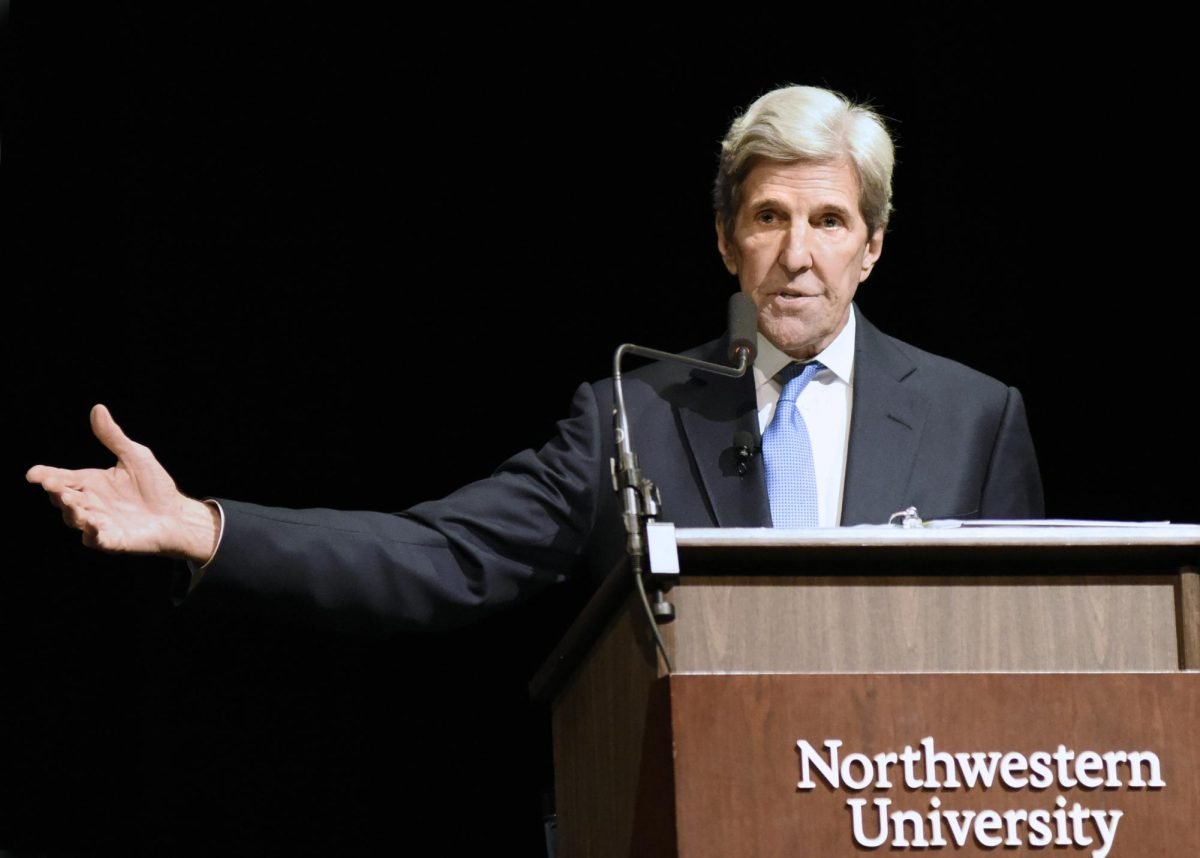Former U.S. Secretary of State and inaugural U.S. Special Presidential Envoy for Climate John Kerry encouraged Northwestern students to advocate for climate action at the 35th Annual Richard W. Leopold Lecture on Tuesday.
Kerry, the Democratic nominee for president in 2004, helped negotiate the Paris Climate Agreement and Iran nuclear deal as secretary of state under President Barack Obama. Later, as climate envoy under President Joe Biden — a position he relinquished earlier this year — he helped negotiate the COP28 agreement, in which 198 countries agreed to transition away from fossil fuels to achieve net zero greenhouse gas emissions by 2050.
“In 2018, scientists (from the Intergovernmental Panel on Climate Change) said, ‘You have 12 years within which to make the decisions and implement them that will avoid the worst consequences of the climate crisis,’” Kerry said. “We now have six years.”
During the lecture, Kerry urged Congress to mobilize U.S. industry — as it did during World War II — to fight climate change.
Kerry said an exceedingly gridlocked Congress stands in the way of meaningful climate action. He added that climate change is a nonpartisan issue requiring collaboration to maintain the Earth’s temperature under 2 degrees Celsius above pre-industrial levels — the standard set by the Paris Agreement.
“Climate has been weaponized now,” Kerry said. “Not one single Republican voted for the Inflation Reduction Act, which is the most significant climate bill ever passed by the United States Congress.”
Prominent Republicans, such as House Speaker Mike Johnson, have opposed the act due to its “wasteful spending.” After 18 House Republicans signed a letter stating that their districts had benefited from federal clean energy investment, Johnson, in an interview with CNBC, said he would keep some of the Act’s clean energy tax credits if Republicans take control of the Senate and presidency in November.
Prof. Wil Burns, associate director of the Program in Environmental Policy and Culture, said he admires Kerry’s commitment to the environment and lifetime of public service.
“He could have easily settled out on his porch — this guy was still working as a climate envoy into his 70s, and he continues to energetically advocate for addressing climate change,” Burns said. “I think that’s admirable.”
Burns added that Kerry has been a moral leader on the climate crisis, convincing greenhouse gas-emitting countries to decarbonize.
Kerry encouraged international cooperation — including between the U.S. and China — to reach a consensus on climate policy. He said governments and industries must meet their climate commitments to prevent further damage and loss of life.
He acknowledged that diplomacy has yielded significant results, citing the International Energy Agency’s World Energy Investment report, which projects that global spending on clean energy technologies and infrastructure will eclipse fossil fuel spending by a 2:1 ratio in 2024.
“I am absolutely convinced that the world will get to a low-carbon or no-carbon economy,” Kerry said. “What I can’t tell you is whether we will get there fast enough.”
Kerry said the U.S. should play a leading role in addressing the climate crisis. Although America’s role on the world stage has evolved over the past few decades, U.S. leadership is necessary to promote international cooperation, he said.
Lance Balk (Weinberg ’80), a retired lawyer, said he and his wife attend the Leopold Lecture every year to learn from experts on interesting topics.
“I think (Kerry) spoke from the heart and in a reasonably bipartisan way, because I think his generation actually did things in a bipartisan way,” Balk said. “I think figuring out how to get to that answer again is a big challenge right now.”
Kerry was a lieutenant in the Vietnam War and later became an outspoken advocate against the war.
Reflecting on the lessons learned from his antiwar advocacy, Kerry said every major political movement in modern history has been led by young people. These young leaders also have a responsibility to be well-informed about all sides of the issues they advocate for, he added.
“Everybody can be a citizen,” Kerry said. “It affords you this great privilege of weighing in and making a difference.”
Email: [email protected]
X: @IsaiahStei27
Related Stories:
— Texas politician Beto O’Rourke speaks at Northwestern College Democrats fall speaker event
— BridgeUSA at NU hosts debate between College Democrats and Republicans
— How one Northwestern lab digs deep for climate change solutions






